#English Grammar Course
Explore tagged Tumblr posts
Text
Welcome to the ultimate online English grammar course—your complete guide to mastering the rules of the English language. Designed for learners of all levels, from absolute beginners to advanced speakers. This course breaks down English grammar into easy, manageable lessons for all learning styles. Explore key topics like nouns, verbs, adjectives, adverbs, prepositions, and conjunctions. Understand how to construct clear and correct sentences with proper word order. Learn verb tenses in detail—present, past, future, perfect tenses, and more.

Grasp tricky concepts like passive voice, conditionals, phrasal verbs, and reported speech. Master punctuation: commas, apostrophes, colons, semicolons, and quotation marks. Study clauses, sentence types, modifiers, articles, and determiners. Interactive lessons with real-world examples help connect grammar to daily use. Access high-quality video tutorials, animations, and instructor-led walkthroughs. Practice what you learn with grammar quizzes, writing tasks, and revision activities. Flexible course structure allows you to learn at your own pace—no pressure or deadlines. Use any device—computer, tablet, or smartphone—to access materials 24/7. Great for students preparing for IELTS, TOEFL, Cambridge exams, or school tests. Ideal for professionals who want to write better emails, reports, and presentations. Build stronger foundations for academic writing, blogging, or creative storytelling. Learn to identify and correct common grammar errors with confidence. Download printable grammar reference guides, cheat sheets, and checklists. Receive instructor feedback on key assignments in premium modules. Get certified—receive a downloadable certificate upon successful completion. Join live sessions for doubt-clearing, grammar games, and community discussions. Track your progress with detailed analytics and achievement milestones. Earn badges and unlock levels as you master each topic and skill. Engage with fellow learners from around the world in discussion boards and forums. Access bonus modules on business English, academic writing, and everyday conversation. Course content is regularly updated to reflect current usage and evolving trends. No prior experience needed—start from scratch or brush up your existing skills. Perfect for self-study or as a supplement to school or university learning. Taught by experienced, certified English teachers with international expertise. Build lasting grammar habits through spaced repetition and guided practice. Includes transcripts, subtitles, and accessibility options for all learners. Affordable pricing with flexible plans and group discounts available. Join thousands of successful learners who have improved their grammar with us. Start your journey today and become confident in using correct English grammar—anytime, anywhere!
#learn grammar online#english grammar course#online english grammar course in india#online grammar course#english grammar lessons#english grammar basics#online learning platform
2 notes
·
View notes
Text

Boost Your Child's English Skills This Summer with RedFox Education's Speak & Shine Camp!
Looking for a fun and engaging way to boost your child's English speaking skills this summer? 🌟 Join RedFox Education's Speak & Shine camp — a short, exciting English course designed for children aged 9 to 14 years. In just 7 days (5th to 13th May 2025), your child will learn to speak boldly, think fast, and master grammar — all through interactive online classes! Limited seats available. Enroll now for just ₹299!
🔹 Age Group: 9 to 14 years 🔹 Dates: 5th to 13th May 2025 (Monday to Friday) 🔹 Mode: Online 🔹 Fees: ₹299 only
👉 For more details and registration, visit: https://redfoxeducation.com/summer-camp/2025
#English speaking course#summer camp 2025#online English camp for kids#improve English speaking skills#RedFox Education#fun English classes#children's summer camp#affordable online classes#English grammar course#communication skills for kids
0 notes
Text
The Ultimate English Grammar Course for Beginners
Mastering English grammar is a key stepping stone for anyone looking to communicate effectively in English. Whether you’re a student, professional, or just curious about language, an English Grammar Course provides the foundation needed for confidence and clarity in speaking and writing. This article explores what makes the ultimate English Language Course Online, covering key elements like core grammar topics, practice methods, and helpful tips to enhance your learning experience.
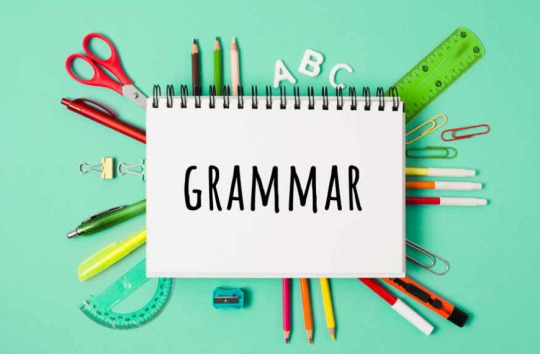
Why an English Grammar Course Matters
Grammar is the backbone of any language. Without a clear understanding of grammar, it’s challenging to form sentences, convey messages accurately, or understand the nuances of English. An English grammar course helps learners navigate rules, exceptions, and structures that make English unique. A structured course provides a step-by-step guide to the basics, building a solid foundation for language mastery. Beginners, especially, benefit from organized lessons that explain grammar concepts in clear, manageable chunks.
What to Expect from a Beginner Grammar Course
A beginner’s Learn English Online typically focuses on essential building blocks. This includes parts of speech, sentence structure, punctuation, and basic verb tenses. These elements are covered in simple, easy-to-understand language with plenty of examples. The course should ideally offer a combination of theory and practical exercises, allowing students to learn a concept and then immediately practice it.
Let’s explore the core elements commonly covered in an English grammar course for beginners:
1. Understanding Parts of Speech
The first step in any grammar course is understanding parts of speech. These are the categories into which words are divided based on their functions in a sentence. The main parts of speech include:
Nouns (e.g., cat, book, happiness) – words representing people, places, things, or ideas
Pronouns (e.g., he, they, it) – words that replace nouns
Verbs (e.g., run, is, become) – words that show action or a state of being
Adjectives (e.g., big, beautiful, quick) – words that describe nouns
Adverbs (e.g., quickly, very, well) – words that modify verbs, adjectives, or other adverbs
Prepositions (e.g., on, in, at) – words that show relationships between nouns and other words
Conjunctions (e.g., and, but, or) – words that join words or groups of words
Interjections (e.g., wow!, ouch!) – words that express emotion
Understanding these basic categories helps learners identify different words in a sentence and their roles, making sentence formation easier.
2. Sentence Structure Basics
The structure of sentences is crucial for clear communication. A beginner English grammar course introduces the concept of sentence components: subjects, predicates, objects, and complements. Lessons on sentence structure explain how to build simple sentences, such as subject-verb-object constructions (e.g., “She reads books.”) and gradually introduce more complex forms.
Courses often cover:
Simple Sentences: Contain one independent clause (e.g., "He runs.")
Compound Sentences: Contain two independent clauses joined by a conjunction (e.g., "She sings, and he dances.")
Complex Sentences: Contain an independent clause and one or more dependent clauses (e.g., "Although she was tired, she continued working.")
3. Verb Tenses and Their Use
Verb tenses express time in English. The ultimate English grammar course will introduce the three primary tenses – present, past, and future – and their variations (simple, continuous, perfect, and perfect continuous). For beginners, it’s essential to focus on the most commonly used tenses, such as:
Present Simple: Used for habitual actions or facts (e.g., "I eat breakfast daily.")
Past Simple: Used for completed actions in the past (e.g., "She watched a movie.")
Future Simple: Used to describe actions that will happen (e.g., "They will arrive tomorrow.")
Once comfortable, students can explore more advanced tenses like present perfect and past perfect.
4. Mastering Punctuation
Punctuation helps clarify meaning in writing. In English, punctuation marks like periods, commas, question marks, and exclamation points signal pauses, end sentences, or show emphasis. A good beginner course will teach the purpose and correct usage of punctuation to enhance writing clarity and prevent misunderstandings.
For instance:
Commas are used to separate items in a list or clauses within a sentence.
Periods end declarative sentences.
Question Marks turn a sentence into a question.
Exclamation Points convey strong emotion or surprise.
Practical Exercises for Grammar Practice
Learning grammar isn’t just about memorizing rules; practice is essential. A quality grammar course will offer numerous exercises and quizzes to reinforce each concept. Here are some practical exercise types that enhance learning:
Fill-in-the-Blank Exercises: Help students practice using specific words and tenses.
Sentence Correction: Develops attention to detail by finding and correcting grammar mistakes.
Rewriting Sentences: Teaches sentence structure by rephrasing sentences using new grammar structures.
Translation Exercises: For non-native speakers, translating sentences into English can boost confidence.
Tips for Learning Grammar Effectively
Take It Slow: Grammar can be complex, so pace yourself. Try to master one concept before moving to the next.
Practice Daily: Dedicate a few minutes every day to practice grammar rules and exercises.
Use Examples: When learning new grammar points, look at several examples to understand context and application.
Ask Questions: If you’re taking a course with a tutor or group, ask questions whenever you’re unclear on a topic.
Reinforce Learning with Reading and Writing: Read simple English books or articles and practice writing sentences using newly learned grammar.
The Importance of Consistency
Consistency is key in mastering grammar. Revisit old topics regularly, as repetition reinforces learning. A good grammar course will encourage revisiting previous lessons to solidify your knowledge. This is especially important with verb tenses and sentence structure, which can be confusing initially.
Final Thoughts
For anyone new to the English language, an English grammar course is the ultimate tool for building a foundation in the language. Covering basic grammar topics, sentence structure, verb tenses, and punctuation, the course empowers beginners to communicate more effectively and confidently. Remember to practice consistently, take each lesson step-by-step, and seek out exercises to reinforce your knowledge. With dedication, you’ll soon see remarkable progress in your understanding and use of English grammar.
0 notes
Text
What are the most commonly used punctuation marks in English
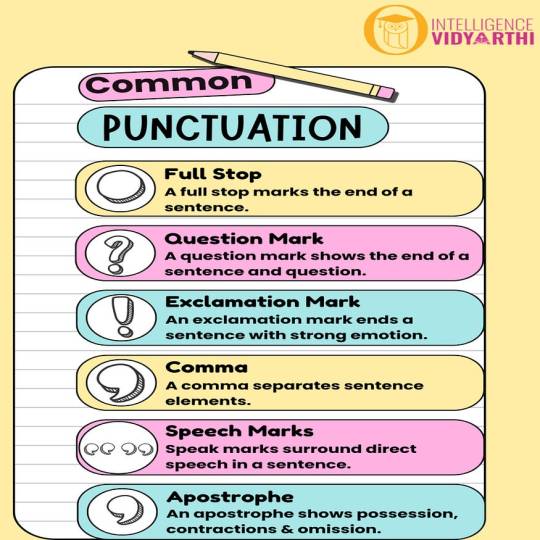
Comma (,): Used to separate items in a list, join independent clauses, and set off introductory phrases or clauses.
Period (.): Indicates the end of a sentence.
Question Mark (?): Used to indicate a direct question.
Exclamation Mark (!): Used to convey strong emotion or emphasis.
Colon (:): Introduces a list, explanation, or quotation.
Semicolon (;): Used to connect independent clauses that are closely related.
Hyphen (-): Joins words together or separates syllables in a word.
Quotation Marks (“ “): Used to indicate direct speech or to enclose titles of short works.
Parentheses ( ): Encloses additional information or clarification within a sentence.
Ellipsis (…): Indicates omission in a quotation or a pause in speech or thought.
These punctuation marks help writers convey meaning, clarify relationships between ideas, and add emphasis to their writing in English
0 notes
Text
Fueling Motivation and Mastering Strategies Before Learning English Language
Getting ready for effective English language learning trip/business includes something beyond (focusing mental and physical effort) on words and sentence structure. It’s tied in with searching for and then finding your inspiration, defining clear goals, and ruling over powerful ways of doing things. With the right outlook and approach, you can open the entryways of chance that go with learning English. Remember that your process will be interesting, and each step you take is a large step (while walking) nearer to progress. So, get everything rolling, remain motivated/brought about, and (take part of something/join others as they do something) in the experience of learning English! To learn English grammar, you can join advanced English grammar course or online advanced English classes.
0 notes
Text
In the ever-evolving landscape of education, traditional approaches to learning are giving way to dynamic and interactive methods. English grammar courses, once confined to textbooks and lectures, are now undergoing a revolutionary transformation through interactive learning.
Read more:
#english cafe#english grammar course#english language course online#english speaking training#english training hub#english spoken classes#fluent english speaking course#learn english online#spoken english classes online#english cafe online
0 notes
Text
found out why my industry crush hasnt been posting as much personal work lately - he's back in his home country visiting his family and giving lectures to art students there ;_; what are emotions, this man is too good.
#the darn school put a music montage over the clips of his lecture lol 😂#i have yet to hear him speak in his own language#like i knew english wasnt his first language because he makes very very subtle grammar mistakes#but his accent is so slight you almost cant tell#im so curious what he was giving a talk on exactly#jrnlsht#crushes are The WORST#i need to get back on the da*ting apps just to distract myself from this#i am also now of course worried about what might happen when he comes back to the us#fuck this government ugh#i heard someone was detained just for having anti tr*ump messages on their phone???#things are getting scary :(
12 notes
·
View notes
Text
"Oh this poor native french speaker with japanese as his second language wouldn't understand the intricacies of our complex english language, which he very much loves and gives a shit about"
⬆️ what people complaining about Jean going along with Cody's they/them pronouns sound to me
#everyone around him is casually using they/them and it's normal to just copy what everyone else in your target language is doing#but sure let's make a big deal out of it cause us romance language speakers with our very gendered languages have rocks for brains#english grammar nerd Jean of course#the golden raven#jean moreau#aftg
16 notes
·
View notes
Text
oh the perpetual problems of a phd student really not well trained enough in an area to be supervising 101 undergrad students
#In our case it’s a nice lady with quite a thick language barrier#Which I think wouldn’t really be an issue except for this being a linguistic course intro thing through English grammar
12 notes
·
View notes
Text
learning spanish as a foreign language and having the opposite distribution of understanding to my heritage language, as in the type of language i’m having the most trouble understanding is simple everyday language spoken around family. sure i can read this scientific article fairly easily but god forbid my bf’s mom asks me what i want for dinner
#to expand: lotta latin based vocab in english but which tends to be more advanced vocab while simpler everyday language tends to be germanic#and such as an eng speaker reading more complex stuff in spanish is like playing spot that latin cognate#also idk if this is true at all but it feels to me the grammar that’s hardest to parse as an eng speaker is like stuff with object pronouns#the amount of time it takes me to understand a sentence with se lo in it 😬 and i feel like that shows up much less in more complex topics#and then on the other hand chinese i think is probably uniquely difficult to read when there’s words u don’t know#like id say im fairly ok at reading chinese but man having to search up those unfamiliar words sucksssss#and it’s the easiest it’s ever been imagine having to use a paper dictionary. yowch#and of course just the general language thing of language they teach u as a foreign learner being very different to its use in real life#especially in casual contexts#so yea. anyway i like spanish a lot this is just an interesting thing im noticing
3 notes
·
View notes
Text
The Ultimate Guide to Choosing the Best English Learning App
It will be rather helpful to state that learning English has become increasingly easy due to the numerous applications existing in the present day. However, when it comes to a large choice, deciding on the Best English Learning App might be a difficult task. These features & considerations are designed to guide you through the basic choices that will let you make a sound decision.
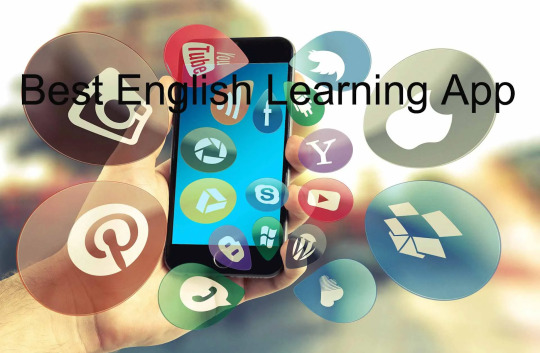
Identify Your Learning Goals
The following are some of the notable considerations to ensure that you choose the right English learning app: This is followed by an aptitude query that aims to know whether you are a first-time learner who is in a position to learn some of the simple grammar and the most important words so that you can begin with the language, or if you a good learner and you want to master the language by enhancing on the fluency and or the way you pronounce the language. Stating your objectives will go a long way in eliminating the numerous apps that are not pertinent to your needs.
Evaluate the Features
Interactive Lessons
English learning app should have challenging lessons that keep users busy and actively involved. Choose applications that give tasks for reading, writing, listening, and speaking skills. It enables the learner to get an all-round learning since it does not focus on a single aspect.
Real-Life Conversations
It should be stressed that modeling actual dialogues is critical for achieving the goal of mastering the given language. Select an app that may contain a feature that engages users in dialogue simulations or the use of live practice sessions with speakers. They will assist you to become comfortable with the use of everyday language.
Progress Tracking
An effective app should be able to monitor and give feedback on the process of its users. To this end, tracking progress is important because it makes you keep focusing on your training while at the same time realizing that you are making progress. Search for those applications that have the option of test, quiz, and performance assessment.
Customizable Learning Paths
In this regard, every learner will do it at his or her level and in his or her way. The best English learning app must enable you to choose the way you want to learn depending on the level that you are at. In this way, learning can be personalized and thus be easier, more fun, and efficient for the learner.
Read Consumers’ Endorsements and Reservations
Users’ feedback and ratings were obtained to assess the usefulness and interactiveness of the application. Evaluate applications based on the rating that is given as well as the reviews of other people. Read the feedback carefully focusing on the issues connected with the application’s interface, content, and support.
Consider the Cost
Some of the English learning apps are free while others call for a slightly subscription fee. Another aspect that may deter candidates is the cost of their education; therefore, another thing you should do is to exercise your budget line and determine how much you are willing to spend to get an education. Note that a paid application may be endowed with additional possibilities and the content of a better quality.
Free vs. Paid Apps
Preferably, free applications are also viable since the user may not want to spend money on a subscription and engage in the application at a professional level. However, they may be limited by advertisement or restricted content of the information shared on the website. standard paid apps provide more features than free ones, do not contain ads, and have better support.
To complete a qualitative assessment of content, it is necessary to make the following evaluations:
Language Accuracy
Make sure that there is a proper language translation of the application. Best practice should suggest that it is designed by or reviewed by competent language practitioners. Insight into how to correct language such as grammar, spelling, and pronunciation is used in the apps.
Up-to-Date Material
Language keeps on changing and it is essential that whatever is being taught corresponds to the existing language. The best English learning app should be active and have fairly frequent updates of the content used in day-to-day communication and new vocabulary added.
Look for Additional Resources
The supplementary material such as cultural tips, idioms, and slang often forms part of a good English learning app. These extras can improve your learning and help you to grasp the language and its use in context.
Check for Offline Accessibility
Offline accessibility can be a strong suit, as can be seen with trawling the web with a laptop on the move and no constant connection to the internet. Several productions enable downloading lessons and practicing in the non-connected mode.
Try Before You Commit
Most of the applications come with a free trial period or a basic functionality of the application. These offers shall be used to try the application before subscribing due to the variety of features the application offers. This way, the use of the trial period will enable you to assess whether or not the application suits your learning style and preference.
Evaluate the User Interface
This was discovered to be very helpful in that a user-friendly interface reduces frustrations while learning. Self-learning English should be coupled with a design that is easy to comprehend and get around when choosing the best English learning app. Stay away from those applications which are complicated or filled up with a lot of options.
It has to be compatible with your device Often people purchase a new device but do not get a product that is compatible with it.
In this case, you have to ensure that the application that you are downloading supports your smartphone. It should not be grainy flicker, or freeze, with no technical problem, no matter if it is on a smartphone, a small or large tablet, or a computer.
Related searches: Learn English Online, IELTS Coaching Centre In Calicut, English Grammar Course.
Conclusion
Selecting the right app to learn English is a decision that one needs to make depending on certain factors such as your learning needs, the features, other user’s feedback, price, and quality of content. Thus, considering these criteria, one is likely to identify an application that will address the set goals and objectives in language learning. Happy learning!
#Best English Learning App#Learn English Online#IELTS Coaching Centre In Calicut#English Grammar Course
0 notes
Text
Trickiest rules in English grammar
Trickiest rules in English grammar pertaining to commonly used words
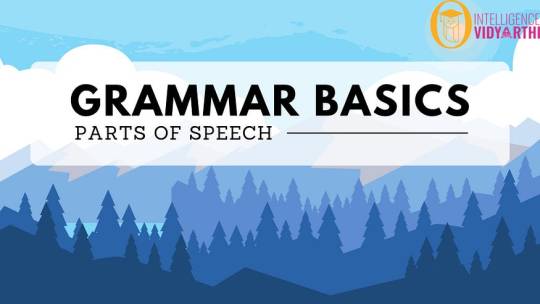
Here are some of the most common grammar mistakes people make:
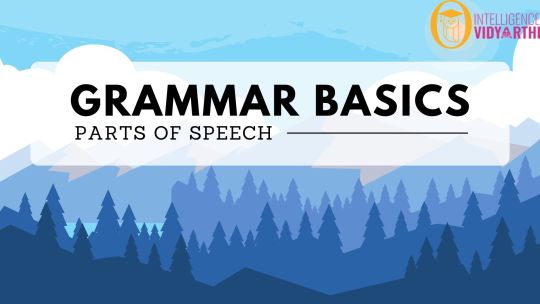
1. Confusing homophones
You’re vs. you’re — Your is possessive, while you’re is a contraction of “you are”.
They’re vs. there vs. they’re — There is possessive, there refers to a place, and there is a contraction of “they are”.
Its vs. it’s — It is possessive, while it’s is a contraction of “it is”.
2. Incorrect word choice
Less vs. fewer — Use less for uncountable nouns and fewer for countable nouns.
Affect vs. effect — Affect is usually a verb meaning “to influence,” while effect is usually a noun meaning “a result”.
Compliment vs. complement — A compliment is a nice remark, while a complement means to complete or match.
3. Punctuation errors
Misusing commas, especially with dependent clauses and introductory phrases.
Confusing apostrophes for possession vs. contractions.
Incorrect use of semicolons and colons.
4. Dangling modifiers
When a descriptive phrase doesn’t clearly modify the intended noun in the sentence. For example: “After declining for months, Jean tried a new tactic to increase ROI.”
5. Passive voice
Overuse of passive voice can make writing unclear and wordy. Active voice is usually preferable.
6. Capitalization errors
Inconsistent capitalization in titles.
Capitalizing common nouns that aren’t proper nouns.
7. Incorrect comparisons
Incomplete comparisons that don’t specify what is being compared.
Illogical comparisons, like comparing apples to oranges.
8. Pronoun errors
Unclear antecedents for pronouns.
Incorrect pronoun case, like using “me” instead of “I” in a subject position.
To avoid these common mistakes, proofread carefully, use a grammar checker, and refer to style guides for specific rules. Consistent practice is key to improving your grammar skills.
0 notes
Text
god i hate this course. but it's good for me to do something i hate if it gets me back in the groove of forcing myself to do academics.
#taking a course on teaching english grammar to foreign language speakers (may be able to help a number of students i know?)#but its mostly selfish because i really really hate grammar and learning how to teach and also fully-online classes#so this is a trial by fire to get my ass in gear#to prepare for the actual master's course i just got accepted into#bc i graduated 6 years ago and im rusty on being on this side of the classroom
4 notes
·
View notes
Text
In today's interconnected world, proficiency in the English language is more crucial than ever. Whether you're looking to enhance your career prospects, communicate effectively in a global setting, or simply pursue personal growth, enrolling in an advanced online english language course can be a game-changer. But what can you expect from these courses, and are they worth your time and effort? Let's delve into the key aspects.
Read more:
#english cafe#online english language course#online english courses#learn english online#english training#english training hub#english grammar#english grammar course#english speaking training#english language course online#english spoken classes#fluent english speaking course#spoken english classes online
0 notes
Text
Super tired.
I don't think I'll be able to get much done today.
I should really start drafting an email to apply for a volunteer position. The only requirement is native like English. Back in the UK I kind of sounded people out on my level and someone I went to see often told me that I should meet the criteria with ease. She told me she didn't have to change anything in the way she spoke when I was around. But I think it's because she was one of the first people who affected my English anyway. I first met her when I was 10 or 11 years old. Her family came to live with us for some days and the next year we stayed with them for four days in total.
Despite this encouragement, all the years of studying and the 17 months that I lived in the UK I'm still afraid to write this email. I do make mistakes here and there. In addition, it's been forever since actually writing anything "official" or "proper".
But time will run out if I don't reach out to them soon. So the first draft should be added to the non-existent to do list for today.
#I bet I'll hate the first draft#it's going to be filled with “I”s and the word interested#cherry rambles#god I miss my upper secondary English teacher and my books#hmm actually I think I have some EF language course books still on my bookshelf along with this random grammar or revise book?
7 notes
·
View notes
Text
*has loved sign language since childhood* *is more or less proficient in american sign language* *has studied and continues to study Deaf culture and its history* *has met and befriended many d/Deaf people*
*asks deaf person to repeat a fingerspelled word more than once*
omg now they hate me and they probably hate me for trying to learn their language and then failing at it so miserably and i should probably just switch majors and gosh they probably think im just another stupid hearing person. please i can do better i swear i didnt mean to disrespect you
every single deaf person that i have ever met: *does not care* *probably didn't even register any mistake i made* *understands that I am learning an entirely new language and am bound to need a bit of help*
#asl#american sign language#sign language#deaf community#this goes for how it feels to learn any language tbh#a previous asl professor of mine was actually spanish#(english was her 3rd language)#and she once said “como estas?”#you know#one of the most well known spanish phrases that you dont even have to take a spanish class to know (“how are you?”)#and i completely blanked#not because I didnt know what it meant#but because i was too nervous to speak spanish with a native spanish speaker#which is actually hilarious#because the whole point of learning more than one language#is to be able to communicate with the people who speak those languages#i think this is more of an american culture thing#the fact that we are often taught to perfect things like pronunciation (if its spoken) and grammar#instead of actual communication#of course sign language grammar is a bit more important to learn than other languages grammar#you say smt wrong in english and a native english speaker will be able to understand you fine#but signed languages are pretty much dependent on the grammar side of things#but my point still stands
14 notes
·
View notes